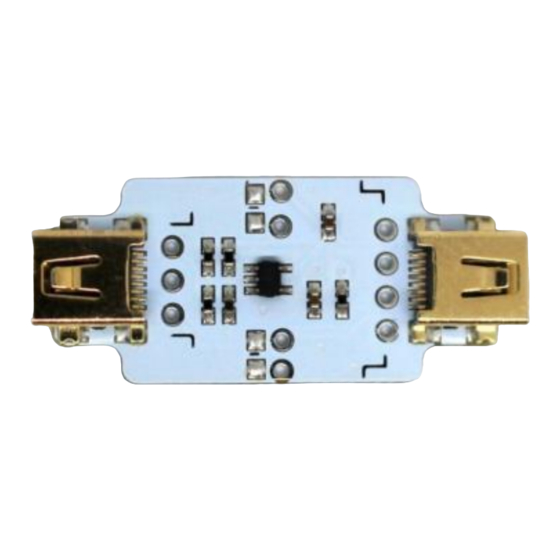
Table of Contents
Advertisement
Quick Links
Advertisement
Table of Contents

Summary of Contents for bITalino SENS-EDA-NC
- Page 1 Electrodermal Activity (EDA) Sensor User Manual...
- Page 2 ATTENTION Please read this datasheet before using your BITalino sensor The information contained in this document has been carefully checked and were made every effort to ensure its quality. PLUX reserves the right to make changes and improvements to this manual and products referenced at any time without notice.
-
Page 3: Table Of Contents
1.8. Physical Characteristics ...................... 7 2. Application Notes ........................8 2.1. Electrode Placement/Sensor Placement ................8 3. Using the EDA Sensor with BITalino & OpenSignals ..............9 3.1. Connecting the sensor to BITalino Systems (BT) ..............9 3.1.1. BITalino (r)evolution Board....................9 3.1.2. -
Page 4: General Information
1.2. Typical Unfiltered Sensor Output Figure 2 shows a typical unfiltered EDA sensor output acquired while being in a relaxed state. The raw digital sensor values received from the BITalino device ranged between 0 and 2 -1 (n=sampling resolution) were converted into the original unit of measurement of this sensor (µ��) using the transfer function found in section Transfer Function (Conversion Formula). -
Page 5: Features
> Psychophysiology > Relaxation biofeedback 1.6. Transfer Function (Conversion Formula) The analog sensor signals acquired with BITalino devices are converted into digital values ranged between 0 and 2 -1 (n=sampling resolution, usually 6-bit or 10-bit) and streamed in the raw digital format. -
Page 6: Electrode Connections & Sleeve Color Meanings
Electrodermal Activity (EDA) User Manual 1.7. Electrode Connections & Sleeve Color Meanings The BITalino EDA sensor can be connected to electrode cables and open wire cables with different connection types, see Table 1. Table 1: Possible connection types for the EDA sensor... -
Page 7: Physical Characteristics
Electrodermal Activity (EDA) User Manual 1.8. Physical Characteristics The BITalino EDA sensor comes in a size of 12mm x 27mm (see Fig. 4). Figure 3: Physical characteristics of the standard EDA sensor. 7 of 18... -
Page 8: Application Notes
Electrodermal Activity (EDA) User Manual 2. Application Notes BITalino EDA sensor is designed to acquire the change of skin activity such as sweat with two measuring electrodes. One example is the placement of the electrodes on the anterior side of the hand on two adjacent fingers of interest (see Fig. -
Page 9: Using The Eda Sensor With Bitalino & Opensignals
3.1.1. BITalino (r)evolution Board The BITalino EDA sensor comes already connected to the BITalino (r)evolution Board. Figure 6: EDA compatible BITalino (r)evolution Board pre-connected to an EMG sensor with UC_E6 connector on one side. 3.1.2. BITalino (r)evolution Plugged The BITalino EMG sensor (UC-E6 sockets) is compatible with all 6 analog input channels of the BITalino (r)evolution Plugged with a sensor cable with UC-E6 connectors. -
Page 10: Bitalino (R)Evolution Freestyle
The BITalino EDA sensor (no connections or Molex Sherlock plugs) is compatible with the BITalino (r)evolution Freestyle. Figure 8: BITalino (r)evolution Freestyle with the possible connection ports (marked in green) for the EDA sensor (without connections) using the Molex Sherlock plugs and sockets or self-mounted cables. -
Page 11: Configuring The Sensor In Opensignals
3.2. Configuring the Sensor in OpenSignals 3.2.1. OpenSignals (r)evolution (Windows, macOS, Linux) Open the OpenSignals (r)evolution device manager to access and configure your BITalino device. Figure 10: Access the OpenSignals (r)evolution device manager. Select the device you intend to use for acquisition by clicking on ENABLE button on the device panel in the OpenSignals device manager. - Page 12 2 Application Notes to learn how to apply the sensors and 3.1 Connecting the sensor to BITalino Systems to learn how to connect your device to your BITalino device. Click on the record button in the OpenSignals main interface whenever you’re ready for your acquisition.
-
Page 13: Scientific Publications Using The Eda Sensor
19, pp. 2033, 2019 Diana Batista, Hugo Plácido da Silva, Ana Fred, Carlos Moreira, Margarida Reis and Hugo Ferreira, "Benchmarking of the BITalino biomedical toolkit against an established gold standard", in IET Healthcare Technology Letters, pp. 1-5, 2019 13 of 18... -
Page 14: Safety & Maintenance
The user must not place the device in the microwave. The user must not insert objects into the holes of the device. The user should not open the BITalino device or its accessories. The repair of the same should be only done by properly authorized PLUX personnel. -
Page 15: Transportation And Storage
Please follow these recommendations to ensure safe transportation and storage of your BITalino equipment and sensors to prevent any damaging of your system. The BITalino equipment and sensors should be stored in the original box in a dry place when those are not being used. -
Page 16: Ordering Guides, Regulatory & Legal Information
Be careful when connecting your BITalino devices, sensors and/or accessories to any third party device including the usage of the 3rd party connection components that are available for BITalino systems as the usage of these components will void the electrical warranty of your BITalino device and sensors and, if not indicated otherwise, the warranty of the 3rd party system you’re connecting to the device. -
Page 17: Regulatory Disclaimer
6.5. Regulatory Disclaimer BITalino products are intended for use in life science education and research applications; they are not medical devices nor are they intended for medical diagnosis, cure, mitigation, treatment or prevention of disease. - Page 18 Electrodermal Activity (EDA) User Manual PLUX Wireless Biosignals S.A. email: plux@plux.info web: http://www.plux.info Headquarters Zona Industrial das Corredouras, Lt. 14 – 1° 2630-369 Arruda dos Vinhos Portugal tel.: +351 263 978 572 fax: +351 263 978 902 Lisbon Office Av. 5 de Outubro, n° 79 – 2° 1050-059 Lisboa Portugal tel.: +351 211 956 542...

Need help?
Do you have a question about the SENS-EDA-NC and is the answer not in the manual?
Questions and answers